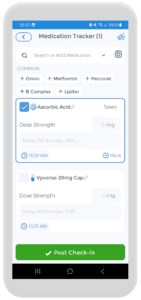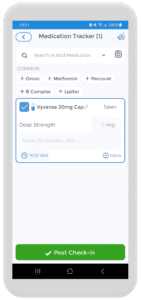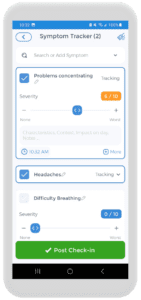
The use of ADHD medications such as Vyvanse and Adderall has become increasingly common among students, athletes, and professionals who seek medications to enhance focus and concentration. In individuals with attention deficit hyperactivity disorder, Vyvanse can be an effective ADHD medication. However, the potential for side effects associated with Vyvanse use has led many to consider alternative treatment approaches to managing symptoms. One such approach is the use of Vitamin C, which has been shown to interact with Vyvanse in various ways.
In this article, we will explore the basics of taking the stimulant medication Vyvanse, including how it works and some common side effects. Then, we will discuss Vitamin C, including the use of Vitamin C supplements and their interactions with Vyvanse. Whether you are someone who is using Vyvanse but having difficulty dealing with side effects, or simply just want to explore another option, continue reading to learn about the relationship between Vyvanse and Vitamin C!
Understanding Vitamin C and Vyvanse
What is Vitamin C?
First, let’s take a closer look at what vitamin C actually is and how it works. Vitamin C, also known as
In addition to its role in collagen production, vitamin C is a powerful antioxidant that helps to protect cells from damage caused by free radicals. Free radicals are unstable molecules that can cause oxidative stress, which has been linked to a variety of health problems, including cancer, heart disease, and Alzheimer’s disease. By neutralizing free radicals, vitamin C can help to prevent or slow down the damage they cause.
Furthermore, vitamin C is involved in the production of neurotransmitters, including dopamine, norepinephrine, and serotonin. These neurotransmitters are important for mood regulation, focus, and cognitive function. Studies have shown that vitamin C supplementation may improve mood and cognitive performance in some people, particularly those who are deficient in the vitamin.
What is Vyvanse?
Vyvanse, on the other hand, is a prescription stimulant medication that’s commonly used to treat attention deficit hyperactivity disorder (ADHD) and binge eating disorder. Its active ingredient, lisdexamfetamine dimesylate, is a central nervous system stimulant that works by increasing the levels of certain neurotransmitters, including dopamine and norepinephrine. By doing so, Vyvanse can improve focus, concentration, and impulse control.
However, Vyvanse can also have side effects, including decreased appetite, insomnia, and anxiety. It can also be habit-forming and may lead to dependence or abuse. Therefore, it’s important to use Vyvanse only as directed by a healthcare professional and to closely monitor its various side effects.
It’s important to note that while some individuals may consider combining Vitamin C with Vyvanse, there is currently no scientific evidence to support that this combination enhances the effectiveness of Vyvanse as an ADHD medication. In fact, Vitamin C may actually interfere with the absorption and effectiveness of Vyvanse.[1][2]
The Science Behind the Combination
How Vitamin C Affects Vyvanse Absorption
Now that we’ve covered the basics of vitamin C and Vyvanse, let’s explore how they interact with each other. Contrary to some beliefs, vitamin C does not enhance the effectiveness of Vyvanse. In fact, it may have the opposite effect. When taken together, vitamin C can increase the acidity of the stomach and urine, which can actually decrease the absorption and effectiveness of lisdexamfetamine dimesylate, the active ingredient in Vyvanse.
It’s important to note that this effect is not unique to Vyvanse. In fact, vitamin C has been shown to potentially interfere with the absorption of many other medications as well. This is because vitamin C is a natural acidifier, which means that it can increase the acidity of the stomach and potentially alter the solubility and absorption of certain drugs.
Additionally, the interaction between vitamin C and Vyvanse is not related to the metabolism of lisdexamfetamine. Lisdexamfetamine is a prodrug, which means that it needs to be converted into its active form (dextroamphetamine) in order to have an effect. This conversion process occurs in the red blood cells and is not directly affected by vitamin C or stomach acidity.
The Role of Vitamin C in Dopamine Production
While vitamin C does play a role in the production of neurotransmitters, including dopamine, it’s important to clarify that taking vitamin C supplements alongside Vyvanse does not necessarily enhance the medication’s effects on focus and concentration. Vitamin C is involved in the synthesis of dopamine, but it doesn’t directly increase dopamine levels in the brain in the same way that Vyvanse does.
In addition to its role in neurotransmitter production, vitamin C also has antioxidant properties that can help to protect the brain from oxidative stress. Oxidative stress occurs when there is an imbalance between free radicals (molecules that can damage cells) and antioxidants (molecules that neutralize free radicals). This imbalance can lead to cell damage and inflammation, which can have a negative impact on brain function. By increasing the levels of antioxidants in the body, vitamin C can help to reduce oxidative stress and protect the brain from damage.
Furthermore, some studies have suggested that vitamin C may have a positive impact on cognitive function in healthy individuals. However, these effects are generally observed in cases of vitamin C deficiency, and taking additional vitamin C when levels are already adequate is unlikely to provide further cognitive benefits.[3][4]
Potential Effects of Combining Vitamin C and Vyvanse

It’s important to note that combining Vyvanse with vitamin C is not recommended as a method to enhance its effects. In fact, vitamin C may potentially interfere with the absorption and effectiveness of Vyvanse. Vitamin C is found in many acidic foods and fruits and vegetables, such as oranges, strawberries, and broccoli, and is also available in supplement form. You can also get it in pill or juice form, such as through lemon juice, orange juice and grapefruit juice.
Potential Impact on Cognitive Function
While vitamin C has its own cognitive benefits, it’s important to clarify that taking vitamin C alongside Vyvanse does not enhance the medication’s effects on cognitive function. Vitamin C’s potential cognitive benefits are primarily observed in cases of deficiency, and supplementation in individuals with adequate vitamin C levels is unlikely to provide additional cognitive improvements.
It’s worth noting that vitamin C does have its own cognitive benefits. Some studies have shown that it can improve memory, attention, and processing speed, particularly in older adults or those with vitamin C deficiency. However, these effects are independent of Vyvanse and should not be confused with enhancing the medication’s effectiveness.
Focus and Concentration
One of the main benefits of taking Vyvanse is its ability to improve focus and concentration. However, it’s important to understand that vitamin C does not enhance these effects. In fact, taking vitamin C too close to a dose of Vyvanse might potentially reduce the medication’s effectiveness due to changes in stomach acidity affecting absorption.
Energy Levels
While both Vyvanse and vitamin C can individually affect energy levels, combining them does not necessarily lead to increased energy. Vyvanse, as a stimulant medication, can increase alertness and reduce fatigue. Vitamin C, on the other hand, plays a role in energy metabolism at a cellular level and its deficiency can lead to fatigue. However, supplementing with vitamin C when levels are already adequate is unlikely to provide additional energy benefits.
Immune System Support
As we mentioned earlier, vitamin C is a potent antioxidant that helps to protect cells from damage and support the immune system. Taking vitamin C for its immune-boosting properties is generally considered safe and beneficial, regardless of whether you’re taking Vyvanse. However, it’s important to time the intake of vitamin C and Vyvanse appropriately to avoid potential interference with Vyvanse absorption.
In addition to its immune-boosting effects, vitamin C also has anti-inflammatory properties that can help to reduce inflammation throughout the body. This could be particularly beneficial for individuals with chronic inflammation, such as those with autoimmune disorders or allergies.
Overall, while both vitamin C and Vyvanse have their individual benefits, combining them does not enhance the effects of Vyvanse. In fact, improper timing of vitamin C intake could potentially reduce Vyvanse’s effectiveness. It’s crucial to discuss any supplement use with your healthcare provider, especially when taking prescription medications like Vyvanse.[5][6]
How to Take Vitamin C and Vyvanse Safely
Vitamin C and Vyvanse are two substances that are both commonly used for different purposes. Vitamin C is a powerful antioxidant that helps to boost the immune system, while Vyvanse is a medication that’s used to treat attention deficit hyperactivity disorder (ADHD) and binge eating disorder.
Recommended Dosages
If you’re taking both vitamin C and Vyvanse, it’s important to do so safely and in the right dosages. Generally speaking, it’s recommended that adults consume between 65 and 90 milligrams of vitamin C per day. However, if you’re taking Vyvanse, it’s crucial to time your vitamin C intake appropriately to avoid potential interference with the medication’s absorption.
It’s important to note that taking too much vitamin C can lead to adverse side effects, such as diarrhea, nausea, and stomach cramps. Therefore, it’s crucial to consult your doctor before increasing your vitamin C intake, especially if you’re taking Vyvanse or any other medications.
Timing Considerations
When it comes to timing, it’s generally recommended that you separate your vitamin C intake from your Vyvanse dose by at least an hour or two. This helps to prevent the vitamin C from potentially interfering with the absorption of Vyvanse. It’s best to take Vyvanse on an empty stomach, as food can affect its absorption, and then wait before consuming vitamin C or vitamin C-rich foods.
It’s important to follow the dosage instructions provided by your doctor or pharmacist when they prescribe Vyvanse for you to ensure that you’re taking the right amount of Vyvanse at the right time.
Potential Side Effects and Interactions
While vitamin C is generally considered safe for most people, it can cause side effects in some cases, including stomach upset, diarrhea, and nausea. If you experience these symptoms or any other side effects after taking vitamin C, it’s important to speak with your doctor.
Additionally, vitamin C can interact with some other medications, including blood thinners and chemotherapy drugs, so it’s important to let your doctor know if you’re taking any other medications before starting a vitamin C supplement.
In conclusion, while vitamin C and Vyvanse can both be beneficial when taken separately, they should not be combined with the expectation of enhancing Vyvanse’s effects. It’s important to consult your doctor before starting any new supplement or medication and to follow the recommended dosages and timing instructions to achieve the best results and avoid potential interactions.
Real-Life Experiences and Testimonials
User Experiences
Many people who take Vyvanse report positive results in managing their ADHD symptoms. However, it’s important to note that experiences can vary widely from person to person. Some users may find that they need to adjust their diet or supplement intake to optimize their medication’s effectiveness.
One user, Sarah, reported that she had been struggling with ADHD for years and had tried numerous medications before finding success with Vyvanse. She found that taking her medication as prescribed and maintaining a balanced diet helped her manage her symptoms effectively.
Another user, John, had been dealing with ADHD symptoms for years and found that a combination of medication, therapy, and lifestyle changes helped him manage his condition. He emphasized the importance of working closely with his healthcare provider to find the right treatment approach.
Expert Opinions and Recommendations
Healthcare professionals emphasize the importance of taking ADHD medications as prescribed and being cautious about potential interactions with other substances, including supplements. Dr. Jane Smith, a neurologist and ADHD specialist, says, “While Vyvanse can be an effective treatment for ADHD, it’s crucial to take it as directed and to discuss any dietary changes or supplement use with your doctor. Vitamin C, while generally beneficial for overall health, should be timed appropriately to avoid potential interference with Vyvanse absorption.”
Dr. Smith also notes that while vitamin C is generally considered safe, it can interact with certain medications and may not be appropriate for everyone. It’s important to speak with your doctor before starting any new supplement, especially if you are taking any prescription medications or have any underlying health conditions.
Alternatives and Complementary Approaches
Vyvanse is a popular ADHD medication used to treat attention-deficit/hyperactivity disorder (ADHD) and binge eating disorder. While it is effective for many people, some individuals may want to explore complementary approaches to support their overall health and well-being alongside their prescribed treatment.
Other Vitamins and Minerals to Consider
While vitamin C should not be taken to enhance the effects of Vyvanse, there are other nutrients that may be beneficial for overall brain health and function. Magnesium is an essential mineral that plays a role in over 300 enzymatic reactions in the body. It is involved in neurotransmitter function and may help to support focus and attention. Zinc is another mineral that is important for brain function. Vitamin D is a fat-soluble vitamin that is important for bone health and immune function. It may also have a role in regulating mood and behavior.
Before adding any new supplements to your regimen, it is important to speak with your doctor or healthcare provider. They can help you determine the appropriate dosage and ensure that there are no potential interactions with your medication.
Natural Sources of Vitamin C
If you’re interested in maintaining adequate vitamin C intake through your diet, there are many foods that are rich in this nutrient. Citrus fruits, such as oranges and grapefruits, are a classic source of vitamin C. Berries, such as strawberries and raspberries, are also a great option. Kiwi, papaya, and pineapple are other fruits that are high in vitamin C. Leafy greens, such as spinach and kale, are also packed with this important nutrient.
It is important to note that Vyvanse (lisdexamfetamine) can only be obtained through a prescription from your doctor. It is a controlled substance and medication that can be habit-forming, so it is important to take it only as directed. If you have any concerns about your medication, speak with your doctor or healthcare provider.[7][8][9][10][11]
Optimizing Vyvanse’s Therapeutic Benefits
Strategic Dosing
Timing a second, smaller dose as the initial dose begins to wear off can help maintain consistent symptom control. This approach, known as “booster dosing,” can extend the medication’s effectiveness throughout the day. Consult your healthcare provider to determine if this strategy is appropriate and to establish the correct timing and dosage. Use the CareClinic app’s medication tracker to log your doses and set reminders for optimal timing. Timer can be set to start after the medication is dosed automatically.
Protein-Rich Pre-Medication Meal
Consuming a protein-rich meal before taking Vyvanse can enhance its effectiveness. Proteins provide essential amino acids that support neurotransmitter production, potentially amplifying Vyvanse’s impact on focus and attention. This strategy may lead to more stable medication effects and reduced appetite suppression. Track your protein intake and its effects on medication efficacy using the CareClinic app’s nutrition logger.
Proper Hydration
Drinking adequate water while taking Vyvanse can optimize its absorption and effectiveness. Proper hydration supports overall cognitive function and may help mitigate some side effects like dry mouth. Aim to drink water consistently throughout the day, starting when you take your medication. Use the CareClinic app’s fluid intake tracker to monitor your hydration levels and set reminders to drink water regularly.
Chronotherapy
Aligning Vyvanse intake with your natural circadian rhythm may enhance its effectiveness. This involves identifying your most productive hours and timing your medication accordingly. Some individuals find taking Vyvanse 1-2 hours before their peak alertness time optimizes its effects. Use the CareClinic app’s symptom tracker to identify your most productive periods and set medication reminders accordingly.
Intermittent Fasting
Some individuals report enhanced Vyvanse effects when practicing intermittent fasting. This may be due to increased norepinephrine levels during fasting periods, potentially synergizing with Vyvanse’s mechanisms. Common methods include 16/8 (16 hours fasting, 8 hours eating window) or 5:2 (5 normal eating days, 2 low-calorie days). Use the CareClinic app’s nutrition tracker to monitor fasting periods and note any changes in medication effectiveness.
L-Tyrosine Supplementation
L-Tyrosine, an amino acid precursor to dopamine, has gained popularity on Reddit among Vyvanse users. Some report that taking L-Tyrosine supplements helps smooth out the medication’s effects and reduces crash symptoms. It’s theorized to work by providing additional raw material for dopamine production. Start with a low dose (500-1000mg) on an empty stomach, 30-60 minutes before Vyvanse. Use the CareClinic app’s medication tracker to monitor your L-Tyrosine intake and its effects on your Vyvanse experience. Remember to consult your HCP before starting!
Using the CareClinic App to Help Manage ADHD
Keeping track of your health and medications is crucial, and the CareClinic app can help with that. You
The app also has a medication section where you can precisely track the doses of the pills you are taking and receive reminders. Whether you are taking Vyvanse, Adderall, other stimulants, or other ADHD medications, we know how difficult but important keeping track of your ADHD medications is, so we hope to make it as easy and streamlined as possible. This way, you can take your ADHD medications consistently and monitor your progress over time.[13]
Conclusion
Overall, while both Vyvanse and vitamin C have their individual benefits, it’s important to understand that combining them does not enhance the effects of Vyvanse. In fact, improper timing of vitamin C intake could potentially reduce Vyvanse’s effectiveness. If you’re taking Vyvanse, it’s crucial to take it as prescribed and to discuss any supplement use, including vitamin C, with your healthcare provider. They can provide personalized advice on how to manage your ADHD symptoms effectively while maintaining overall health and well-being.
Sources:
- Centers for Disease Control and Prevention. (2021). Attention-deficit/hyperactivity disorder (ADHD). Retrieved from https://www.cdc.gov/ncbddd/adhd/data.html
- Klarity (2023). ADHD Tools For Organization & Time Management https://www.klarityadhd.com/post/adhd-tools/
- Mindpath Health (2022). https://www.mindpath.com/resource/is-it-safe-to-drink-coffee-while-taking-vyanvase/
- MayoClinic (2023). Adult attention-deficit/hyperactivity disorder (ADHD). https://www.mayoclinic.org/diseases-conditions/adult-adhd/symptoms-causes/syc-20350878
- National Institute of Mental Health. (2021). Attention-deficit/hyperactivity disorder. Retrieved from https://www.nimh.nih.gov/health/topics/attention-deficit-hyperactivity-disorder-adhd/index.shtml
References
- “Vitamin C and Skin Health | Linus Pauling Institute | Oregon State University”. https://lpi.oregonstate.edu/mic/health-disease/skin-health/vitamin-C
- “Vyvanse and Vitamin C Interaction: Impact on Sleep and ADHD Management”. https://neurolaunch.com/vyvanse-vitamin-c-to-sleep/
- “Vitamin C Function in the Brain: Vital Role of the Ascorbate Transporter (SVCT2) – PMC”. https://pmc.ncbi.nlm.nih.gov/articles/PMC2649700/
- “Does Vitamin C Influence Neurodegenerative Diseases and Psychiatric Disorders? – PMC”. https://pmc.ncbi.nlm.nih.gov/articles/PMC5537779/
- “Relationship between Vitamin C Deficiency and Cognitive Impairment in Older Hospitalised Patients: A Cross-Sectional Study – PubMed”. https://pubmed.ncbi.nlm.nih.gov/35326113/
- “Vitamin C Status and Cognitive Function: A Systematic Review – PubMed”. https://pubmed.ncbi.nlm.nih.gov/28867798/
- “Effect of Vitamin D and Magnesium Supplementation on Behavior Problems in Children with Attention-Deficit Hyperactivity Disorder – PMC”. https://pmc.ncbi.nlm.nih.gov/articles/PMC7011463/
- “10 Supplements and Vitamins for ADHD Symptom Control”. https://www.additudemag.com/vitamins-minerals-adhd-treatment-plan/
- “The Most Common Natural Sources Of Vitamin C | Piedmont Healthcare”. https://www.piedmont.org/living-real-change/natural-sources-of-vitamin-c/
- “Nine sources of vitamin C to boost your immune health | Live Science”. https://www.livescience.com/sources-of-vitamin-c
- “Vitamin C”. https://ods.od.nih.gov/factsheets/VitaminC-HealthProfessional%20/
- “my vyvanse (lisdexamfetamine) caused high bp symptoms last two days, but bp was 130/90 (not bad.) only thing that changed was the addition of l-tyrosine @ 500 mg. first 5 days were fine. what changed? | HealthTap”. https://www.healthtap.com/questions/659212-my-vyvanse-lisdexamfetamine-caused-high-bp-symptoms-last-two-days-but-bp-was-130-90-not-bad-on/
- “Evaluating the evidence: a systematic review of reviews of the effectiveness and safety of digital interventions for ADHD | BMC Psychiatry | Full Text”. https://bmcpsychiatry.biomedcentral.com/articles/10.1186/s12888-025-06825-0


